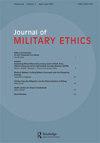Igitur qui desiderat pacem, praeparet bellum atomica
Q2 Arts and Humanities
引用次数: 2
Abstract
ABSTRACT Is it coherent to defend nuclear deterrence from an ethical and just-war point of view, given the likely devastating effects of an actual nuclear exchange? This article holds that the salutary effects of successful deterrence are so substantial that, given the state of the world today, such deterrence does abide by the proportionality criterion of the just war tradition when considered against the direct political effects of deterrence, not the military effects of detonations. This article further explores why such salutary political effects are likely to remain viable in the twenty-first century, given both technical and political developments. The article also explores some of the main arguments against nuclear deterrence derived from the Cold War and considers to what extent they are relevant today.因此,无论谁渴望和平,都要为原子战争做准备。
考虑到实际核交换可能造成的毁灭性影响,从道德和正义战争的角度捍卫核威慑是否连贯?本文认为,成功的威慑的有益影响是如此巨大,鉴于当今世界的状况,当考虑到威慑的直接政治影响,而不是爆炸的军事影响时,这种威慑确实符合正义战争传统的相称性标准。本文将进一步探讨,鉴于技术和政治的发展,为什么这种有益的政治影响可能在21世纪仍然可行。本文还探讨了冷战时期反对核威慑的一些主要论点,并考虑了它们在多大程度上与今天有关。
本文章由计算机程序翻译,如有差异,请以英文原文为准。
求助全文
约1分钟内获得全文
求助全文

 求助内容:
求助内容: 应助结果提醒方式:
应助结果提醒方式:


